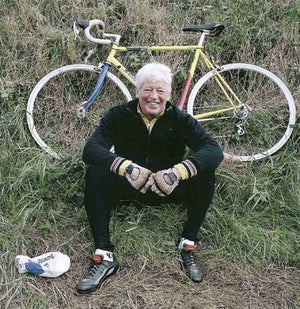Tim Hilton 1941 - 2024

Image belongs to Harper Collins
Ruskin biographer Tim Hilton died on 6th January 2024. Here Companion Dinah Birch pays tribute to a man who had a huge impact on Ruskin studies.
Tim (John Rodney) Hilton
Born 7th July 1941 – died 6th January 2024
Tim Hilton was born on 7th July 1941. His parents, Rodney and Margaret (née Palmer) Hilton, were committed communists. Rodney Hilton was a founder member of the Communist Party Historians Group, and as a boy Tim was a reluctant participant in Communist Party activities. This imbued him with a lifelong hostility to intellectual conformity – and to meetings. His childhood was troubled, particularly after his parents divorced in 1951, and he developed an interest in cycling that provided an escape from unhappiness. It was a fellow cyclist – a retired bookseller and socialist - who introduced him to Ruskin’s work. He read English at Balliol College Oxford (1961-4), and went on to become a free-lance art critic, teaching in art schools, and writing for the Times Literary Supplement. He published a number of books – Keats and his World (1971), Picasso (1976), The Sculpture of Philip King (1992). His The Pre-Raphaelites (1970) remains an accessible and fascinating introduction to this group of artists.
In the early 1970s, he began to work on his major biography of John Ruskin. Always reluctant to accept established authority, he believed that the 39 volumes of the 1903-12 Library Edition of Ruskin’s works were often unreliable. He undertook the heroic task of going back to original sources, spending many months in Oxford’s Bodleian Library and in Bembridge School on the Isle of Wight, then the location of the most important holdings of Ruskin manuscripts, and forming a productive friendship with the curator of the archive, J. S. Dearden. The first volume of his biography, John Ruskin: The Early Years, was published in 1985, and John Ruskin: The Later Years followed in 2000. Lucidly written, sympathetic though not always uncritical, and sharply perceptive about the network of relationships and influences that shaped Ruskin’s writing, this remains the best starting point for anyone wishing to know more about Ruskin’s life.
During his years of biographical research, Tim became a friend and mentor to many of those who were then working on Ruskin. He was a warm supporter of the efforts of younger Ruskin scholars, giving generously of his time and expertise to encourage their investigations. Tim always maintained a cautious distance from organisations and institutions – even Ruskinian ones, like the Guild of St George. ‘I’m not a “joiner”’, he would explain. He went his own way, and he could be a spiky critic of academic orthodoxies of any kind. But he was deeply learned in the life and achievements of John Ruskin, and deeply committed to the humane values and richness of thought that he saw in Ruskin’s work. Those who care about Ruskin’s legacy owe him a profound debt. He will be greatly missed.
Dinah Birch January 2024
Robert Hewison also wrote an obituary of Tim, for The Guardian, which you can read HERE.
